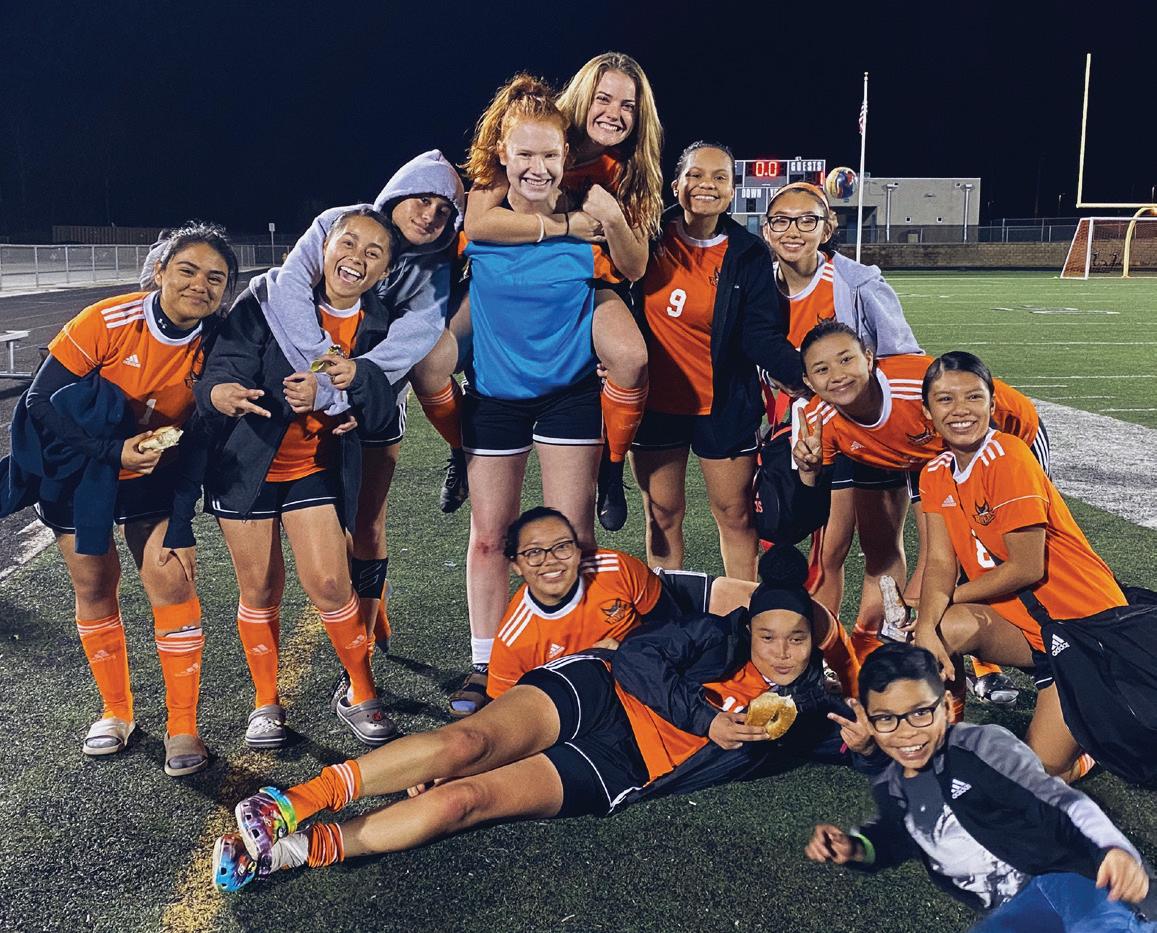
10 minute read
Advising helps scholar navigate college admissions
Ivy League dreams
Advising helps scholar navigate college admissions
Advertisement
By Justin Vick
>> Years of hard work are paying off for Gina Coque, a Charlotte native attending her first semester at Yale University.
Gina aggressively pursued scholarships, because she did not want to put her family in debt from having to pay for col lege. Gina had her heart set on attending Columbia University for about a year, but she learned two weeks before the May dead line that she would have to pay $2,000 more a year than she orig inally thought.
So she switched to Yale, an Ivy League school that offered her a better financial aid package.
“The prestige does play a factor for me,” said Gina, the daughter of immigrants. “As someone who doesn’t have generational wealth or family connections, Yale is a school that offers more opportu nities that I can take advantage of.”
Gina credits CollegePoint for helping her through the college application process. CollegePoint provides free virtual advising to high-achieving high school se niors from low- to moderate-in
come homes.
Gina learned about College Point through a pamphlet she received in the mail touting its free advising. The idea sounded appealing – almost too good to be true. She Googled the organi zation to see if it was a scam before signing up.
Soon, she was matched up with a Sarah Alford Nollenberger, an advisor based in North Carolina.
“Gina was really self-motivat ed,” Alford Nollenberger said. “I feel like I had very little to do with her success. She went after it.”
Low-income students face challenges when it comes to ap plying for colleges. Alford Nollenberger describes the process as long and complex.
“When you are a first-gener ation college student and don’t have that direct knowledge and experience within your family, you have to find that from other places,” Alford Nollenberger said.
Even if a student is lucky enough to attend a high school with a knowledgeable guidance counselor, Alford Nollenberger said the counselor could be over whelmed with a caseload of hundreds of students.
“It’s just really overwhelming to even know where to start,” Alford Nollenberger said. “It’s also really difficult to go through the process without a guide.”
Finances are another barrier. Students may not have the re sources to pay for a tutor who can help them with classes or pay for that course to better prepare them for the SAT or ACT. They may not have time to get involved in extracurricular activities or com mit to internships because they are working to support their families or taking care of younger siblings.
Alford Nollenberger generally begins working with students the summer before their senior year.
Her goal is to talk with stu dents monthly. She’ll focus five core meetings throughout the year around key points in the col lege application process. She’s also available for questions in between those sessions.
“We have shown that virtual advising is not only doable but it’s scalable,” program lead Nick Watson said, pointing to the use of technology as part of College Point’s foundation. The program provides advising via video confer encing, phone calls, text messages, social media and chatbots.
Even for hard-working and high-achieving students like Gina Coque, interacting with an academic advisor helped make the college admissions process easier to navigate.
Photos by CollegePoint
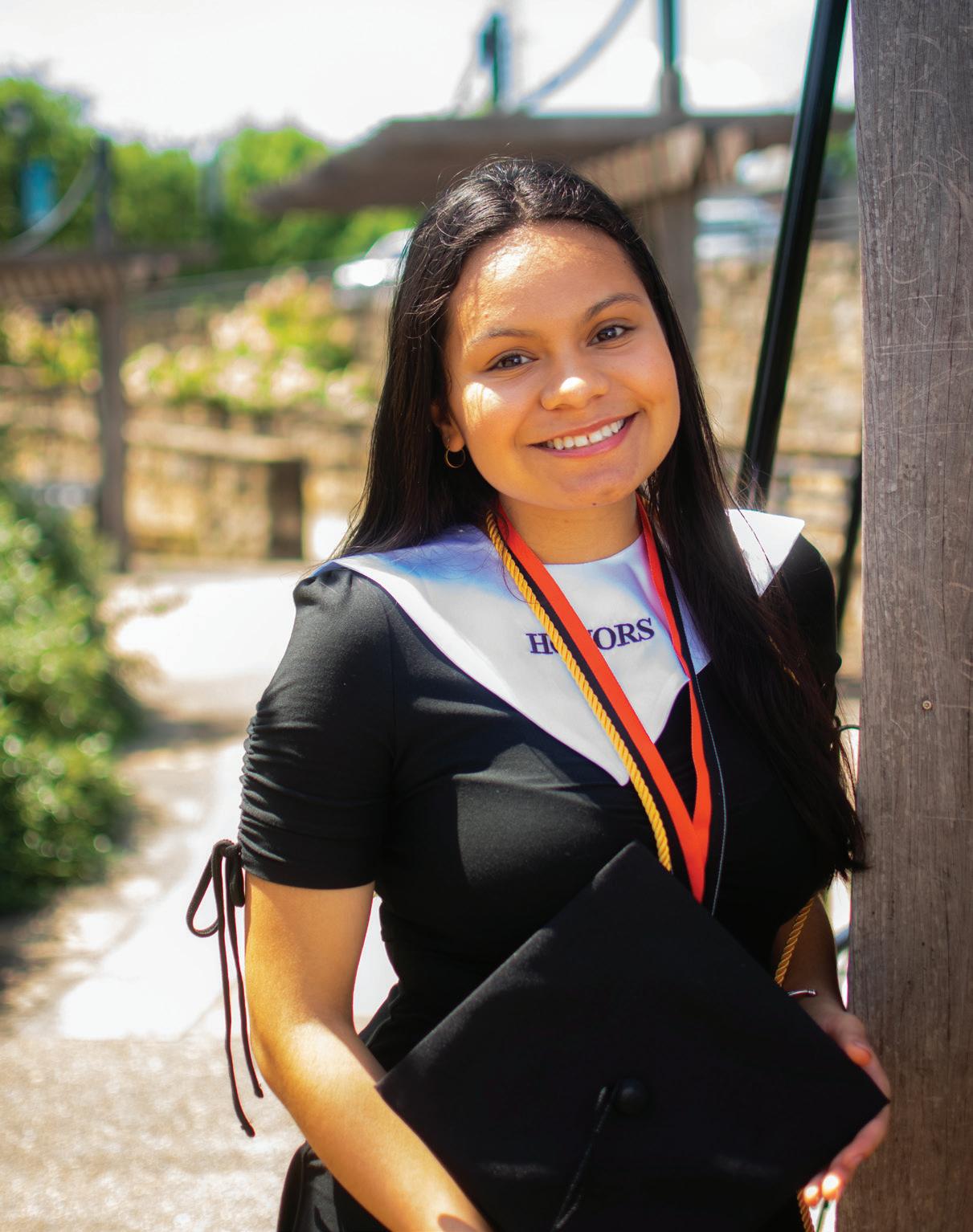
“All of our advising, at the end of the day, is about meeting the student where they are at,” Watson said.
CollegePoint works with stu dents across the country who have at least a 3.5 grade point average and score in the 90th percentile of the PSAT, SAT or ACT. They also come from families with incomes of $80,000 or less.
Gina earned the distinction of being valedictorian of her school's most recent graduating class.
She gained an appreciation for reading and writing while taking an Advanced Placement World His tory course. She wants to continue learning in college more about the power of words. She understands that knowledge is power.
“The more you can learn about things and the more you can spread it to make information ac cessible, maybe some more change can happen,” Gina said. “Some times people don’t know why they are in certain circumstances and they don’t know there are solutions around it.” q
School spotlight Small classes make big difference at United Faith
By Justin Vick
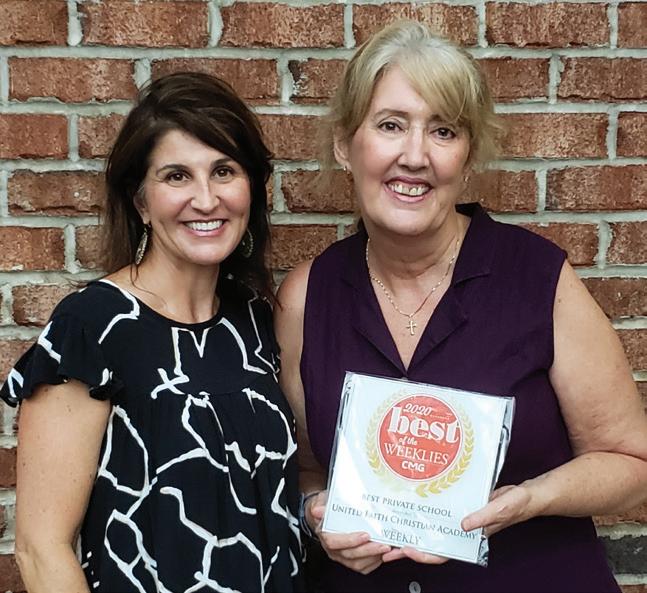
Tonya Bronson and Susan Blumenthal celebrate United Faith Christian Academy winning Best Private School in South Charlotte Weekly’s Best of the
Weekly awards. CMG photo
>> Susan Blumenthal was part of the United Faith Christian Academy family well before she became head of school.
Her daughter graduated from United Faith in 2004. She’s also experienced the school from the perspective of a grandparent, fac ulty member and dean of students.
“Our vision is to provide high-quality college-prep educa tion while we help students discover their faith for themselves, grow in their relationship with Christ and become confident Christians so they can go out in the world and make a differ ence,” Blumenthal said.
United Faith serves about 150 students in prekindergarten through high school. The south Charlotte school has seen increased interest from families as schools have tried adapting to learning during the COVID-19 pandemic.
School tours have increased among families with children in elementary school, according to Tonya Bronson.
Bronson has worked at United Faith for six years. She recently transitioned from the admissions department to the guidance office.
“More families are coming in saying, ‘We’ve had our eye on you for a long time and we love what we hear about you, we just love our public school,’” Bronson said. “‘I’ve never been motivated to pay tuition.’”
Families are now starting to find that motivation.
While south Charlotte is bless ed to have highly rated well-run schools, United Faith’s small size gives administrators the flexibili ty to adapt fast.
As schools closed across the state in March, staff at United Faith spent two days getting ev erybody up to speed on how to do online classes and setting a schedule. Classes were up and running by the third day.
The small enrollment comes in handy amid COVID-19 as schools try to observe social dis tancing among students.
Students also have increased opportunity to make a sports team or perform in an on-stage theater production. They may not have the same opportuni ties at some of south Charlotte’s much larger public schools.
“They can really excel in these areas outside of the classroom that they may be too intimidat ed to go out for or just by sheer numbers they would never make a team,” Bronson said.
Nineteen students graduated from United Faith in the spring. Graduates go on to colleges and universities like UNC-Chapel Hill, Purdue and West Point. Alumni come back and explain the edge they get in college.
“Because their classes are small er, they have relationships with teachers and it was those relation ships that built their confidence,” Blumenthal said. “They could deal with anything and they knew they could go and talk to a profes sor or TA and resolve issues.”
“Our ultimate goal is to give the kids confidence in their God-given talents and really challenge them in who they are so they know when they graduate where they are going and how to succeed,” Bronson said. q
SMALL SCHOOL BIG FAMILY
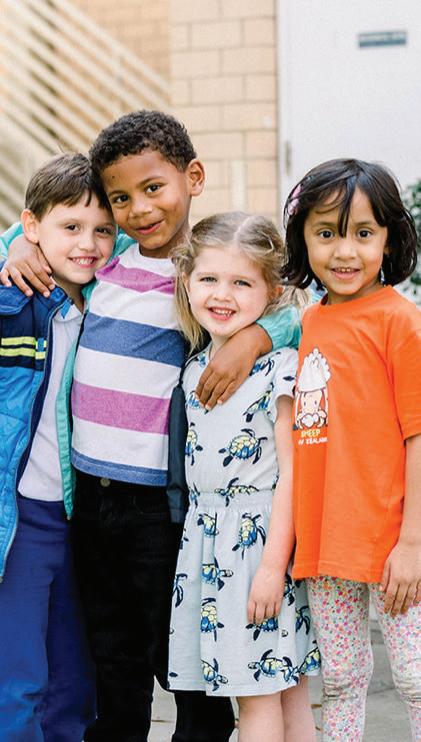
Now more than ever, your children need a school where they are known for their unique personalities, loved by their teachers, and challenged to rise to their personal best.
At Charlotte Prep, children receive an outstanding education in a safe, nurturing environment that fosters intellectual, expressive, physical, and ethical growth.
RSVP HERE FOR VIRTUAL INFO SESSIONS
MONTESSORI ( AGE 2-5 )
OCTOBER 28 @ 9:30 A.M.
KINDERGARTEN - 8TH
NOVEMBER 5 @ 9:30 A.M.
charlotteprep.org/admissions/virtual-admissions-portal admissions@charlotteprep.org
A recipe for success
Community Culinary School of Charlotte to graduate 1000th student
By Karie Simmons >> Like any great success story, the Community Culinary School of Charlotte had humble beginnings.
The nonprofit started in a one-room section of unfinished warehouse space with two stu dents and a single goal in mind: for graduates to have living wage jobs with career potential.
Nearly 23 years later and the school has grown into a space at 9315 Monroe Road with six of fices, a conference room and a commercial kitchen where 50 to 60 students are trained each year. CCSC also offers catering services and has a storefront café. Both prepare students for employment by offering front-of-the-house ex perience, customer service training and job opportunities while gener ating revenue for the school.
There have been 998 graduates since 1997, with the 1000th stu dent set to graduate in December.
Unlike other culinary schools in the area, CCSC is specifically for adults who face barriers to longterm successful employment.
Director of Development Anne Lambert said the goal is to break the cycle of poverty while increas ing upward mobility of disadvantaged groups. So far, she said the school has been successful. Ap proximately 83% of students have a job by graduation and 89% are still working after six months.
The 14-week program teaches culinary arts, job-readiness skills and goal-setting to help students obtain and maintain career-level jobs. During their 320 hours of training, students are exposed to more than 200 recipes, assist in preparing more than 12,780 pas tries and help cook and serve more than 2,450 meals in the café. They also annually prepare over 5,000 meals provided to the community.
Chef Ron Ahlert said students never put out anything that’s less than delicious. He has been with the school since 2000, originally as a chef instructor before becoming executive director in 2006.
“What we’re doing is making food for friends,” Ahlert said. “The people who come to our café are our friends and I take that very se riously. They chose us out of all the places to eat in Charlotte.”
Outside of the kitchen, stu dents meet with a counselor, or life coach, who helps them set goals and build social-emotional skills.
“We’re taking care of the whole person and that’s hard skills and soft skills,” said Bonnie O’Rourke, CCSC’s comptroller. “Not only learning in the kitchen, but how to get along with people and work together.”
O’Rourke said the idea is for students to talk about their per sonal lives and any barriers that could prevent them from graduat ing. In some situations, counselors can connect students to resources for child care, financial assistance, medical care and other needs.
Students at the Culinary School of Charlotte log 320 hours of training
before graduation. Karie Simmons/CMG photos
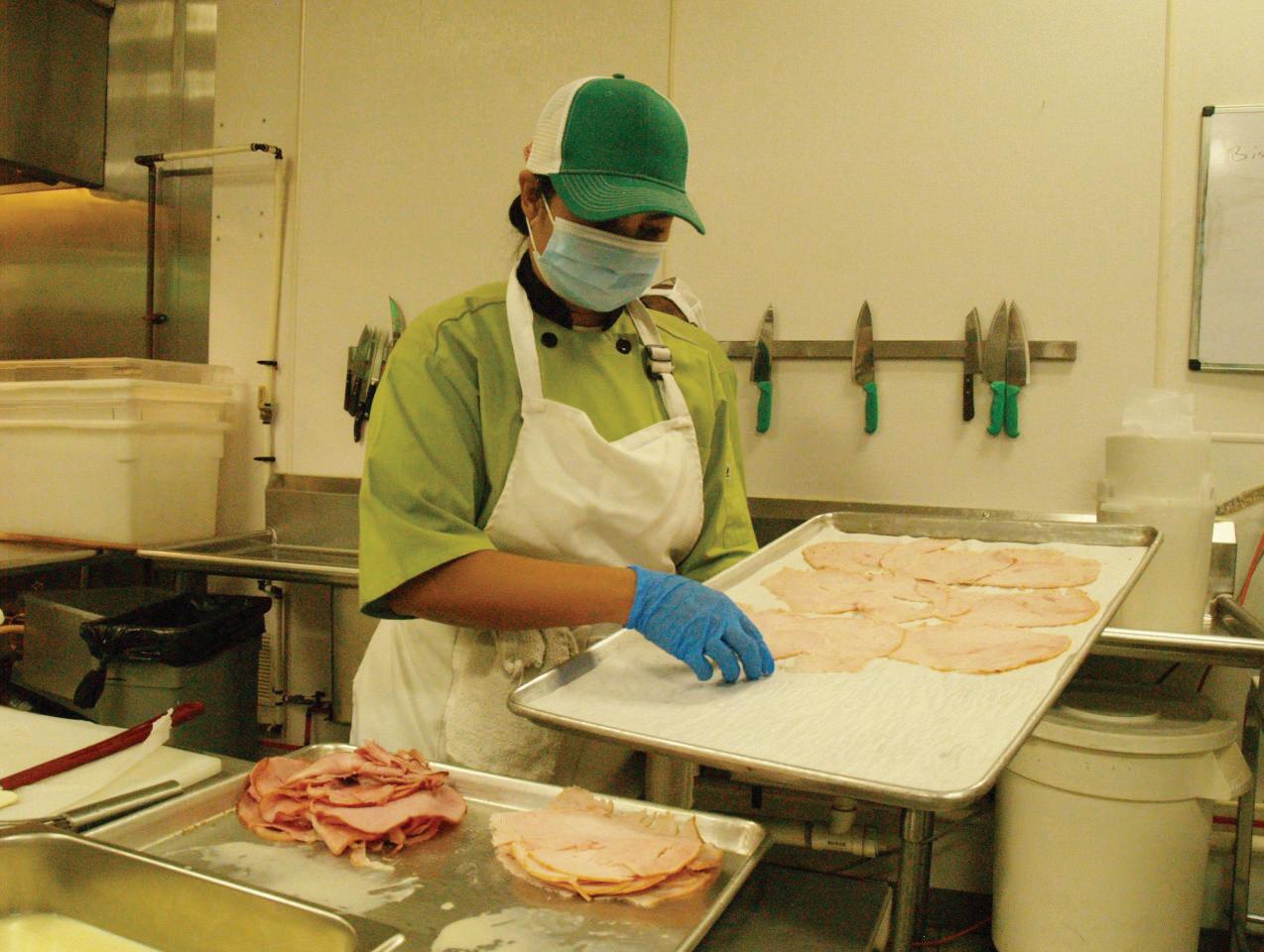

“We try to find a solution that helps them stay in the program,” Lambert said.
More than halfway through the program, Sharon Watkins said she has already learned so much, from knife skills to the chemistry of bak ing. She even learned a new way to make macaroni and cheese that’s less expensive and feeds more people.
Before attending CCSC, Watkins worked in banking. Watkins always wanted to go to culinary school but thought she couldn’t afford it.
“For a long time, it was just a dream,” Watkins said.
Tuition is an estimated $7,400, but thanks to CCSC’s funding model, students never have to pay.
The school is supported by café and catering sales, donations and special events. More than half of the school’s money comes from public funding and grants.
CCSC gives Watkins the skills and confidence to eventually open her own business, and she still has time to take care of her mother when she gets home from school.
She recommends the program to anyone who needs direction in life or is not sure what they want to do.
“This is the first place I would send them,” Watkins said. “This is not only cooking, but they teach you life skills and how to deal with the outside world.” q
Want to learn more?
Community Culinary School of Charlotte is located at 9315 Mon roe Road, Suite D, Charlotte. Visit www.communityculinary.org or call 704-375-4500 for details.


